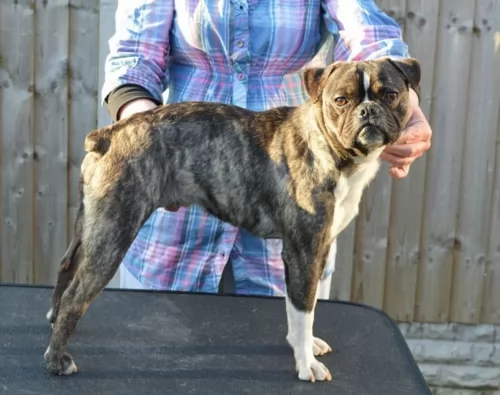 Petzlover
PetzloverBoth Fruggle and Other are originated from United States. Fruggle may grow 54 cm / 21 inches shorter than Other. Fruggle may weigh 104 kg / 229 pounds lesser than Other. Fruggle may live 5 years less than Other. Fruggle may have less litter size than Other. Fruggle requires Moderate Maintenance. But Other requires Low Maintenance
 The Fruggle is a mixed breed/hybrid crossover between a Pug and a French Bulldog. The “Frug” is considered a designer breed, developed in the United States and growing in popularity. These hybrid dogs all can be different taking their looks and characteristics from one or both of the parent dogs in different ways. Within the same litter you can have pups that look like pugs and act like French Bulldogs or look like French Bulldogs and act like pugs.
The Fruggle is a mixed breed/hybrid crossover between a Pug and a French Bulldog. The “Frug” is considered a designer breed, developed in the United States and growing in popularity. These hybrid dogs all can be different taking their looks and characteristics from one or both of the parent dogs in different ways. Within the same litter you can have pups that look like pugs and act like French Bulldogs or look like French Bulldogs and act like pugs.
Also known as a Frenchie Pug, the hybrid is growing in popularity and new to the United Kingdom but recognized by the American Canine Hybrid Club. It is not recognized by the AKC or American Kennel Club. They are developed from purebred dogs but are not a purebred breed at this time. It would take generations of breeding true for that to happen. At the same time the Fruggle is an adorable little dog with characteristics of both its purebred parents.
The French Bulldog is a descendent of dogs that lived with ancient Greeks, the Molossians Phoenician traders spread the dog throughout the known world. These dogs were used in dogs fights and sporting until 1835 when these were outlawed. The Frenchie became a companion dog for the ladies of Paris, writers, artists and fashion designers. The Pug, on the other hand, can trace their history as far back as Confucius in 700BC. They are one of the most ancient dog breeds in existence today. They were the property of the Imperial Family in China, guarded by soldiers. Stealing a pug in Imperial China was punishable by death.
There is no real history or the Fruggle as it is too young in its existence as a separate type of dog. It is considered a breed – just a hybrid breed. In addition to the American Canine Hybrid Club, it is also recognized by the International Designer Canine Registry, the Designer Breed Registry, the Dog Registry of America and the Designer Dogs Kennel Club.
Dog lovers are thrilled because there is such diversity to choose from when looking for a pet.
There are so many other dogs that don’t have any particular breed name, and these can be tiny dogs or massive dogs that you would have to think twice about before buying one, as a large dog can eat you out of hearth and home.
All dogs, pedigreed or other, have descended from the wolf but it is unsure about when dogs were actually domesticated. One thing is sure, it is amazing to think that dogs descended from wolves but that you get so many varieties to day – different sizes, different coat colors and lengths, some have erect ears, others floppy, some are lean and mean and others muscular and heavily-set. They have all originated from different parts of the world.
There are well over 100 different pure dog breeds as well as plenty of other dogs. In fact you can create many different dogs by breeding certain of them to get the looks and characteristics you want.
 Being a designer dog, the appearance and characteristics of the Fruggle varies from pup to pup. Most do have flat faces, large eyes, and short muzzles. The Frug is a short, sturdy and compact dog. Their tail is over the back in a tight curl, and the ears are round and large. They are called Rose Ears. The nose and eyes are black or very dark and they have wrinkles on the forehead. This is the basic generalization of a mix between the Pug and the French Bulldog. The reality is they are all different. Most often they have a Pugs face with the French Bulldogs ears. They are a little smaller than the French Bulldog and a little larger than the Pug. Their hair is fine, glossy, smooth and short.
Being a designer dog, the appearance and characteristics of the Fruggle varies from pup to pup. Most do have flat faces, large eyes, and short muzzles. The Frug is a short, sturdy and compact dog. Their tail is over the back in a tight curl, and the ears are round and large. They are called Rose Ears. The nose and eyes are black or very dark and they have wrinkles on the forehead. This is the basic generalization of a mix between the Pug and the French Bulldog. The reality is they are all different. Most often they have a Pugs face with the French Bulldogs ears. They are a little smaller than the French Bulldog and a little larger than the Pug. Their hair is fine, glossy, smooth and short.
Dogs today come with so many looks. ‘Other’ dogs are vast and varied. They may be pedigreed dogs that are ‘off the radar’ or they may be among the many ‘cross-breed’ dogs there are.
You can get a tiny Chihuahua, measuring just 9cm in height, but you can also get a huge dog like the Great Dane that can stand at up to 90cm in height. It isn't however, a heavily built dog like the giant Newfoundland which can weigh up to 117 kg or so.
Some dogs are intelligent, others not so much. Others are social and others more reserved. Some won’t be able to tolerate being cooped up indoors and not being able to be outdoors involved in an activity, while others are more indoor dogs.
Some dog are friendly, others indifferent, some boisterous and sporty, others docile and lazy. There are so many other dogs that don’t make the pedigreed list, but they’re adored by their human family for being so utterly unique.
 The Fruggle is very child friendly
The Fruggle is very child friendly
The Fruggle is a good watchdog and can be taught many tricks.
He is not very adaptable. He can live in city and in apartments much better than in the country or on farms. He needs air conditioning
Is very high as the Fruggle is very intelligent
There are so many dogs, some are pedigree dogs and some aren’t. Some dogs are registered with kennel clubs and others aren’t.
Every dog has some amazing characteristics that make them so adorable. These kennel clubs divide dogs into categories such as Terriers, working dogs, herding dogs, toy breeds, hounds and so on. Pedigree breeds belong to these groups.
Other dogs are just as special, even if they don’t fall into the many dog breeds recognized by major kennel clubs.
There are so many other dog breeds, and if you want to bring some canine magic into your home and heart, apart from the very many expensive dog breeds out there, there are other dogs.
These are hybrids or true one-of-a-kind pavement specials that come at a fraction of the price but with the most amazing and wonderful characteristics you can imagine and which will make a most splendid pet.
 The Fruggle can inherit any of the health issues of either parent or they might be healthier than either parent. Some of the issues that the Fruggle might face include:
The Fruggle can inherit any of the health issues of either parent or they might be healthier than either parent. Some of the issues that the Fruggle might face include:
Other dogs are considered somewhat healthier than purebred dogs because they come from a broader gene pool. Nonetheless you still need to be aware of certain dog illnesses that your dog can develop -
This is a common ailment in dogs, and skin allergies can cause your dog a lot of discomfort and pain. They lick and lick and aggravate the situation. Sometimes fleas, chemicals and dog shampoos can aggravate the skin too. There are several things to look at – from making environmental changes to changing your dog’s food.
Cancer is common in dogs, just as in human beings, with there being a number of different cancers. Whenever you brush your dog, run your hands over him to check if there are any unusual lumps on him and have them examined if you do discover a lump.
Other dog illnesses to watch out for include bloat, ear and eye infections, cataracts, hip dysplasia and obesity, among others.
 1/2 cup should be fed daily in two to three meals of high quality dry puppy food
1/2 cup should be fed daily in two to three meals of high quality dry puppy food
1/2 to 2 cups should be fed daily in two meals of high quality dry adult food
Quite often the first generation hybrid has much better health than either of the founding breeds. The same is not true of the second and third generations.
The Fruggle is a laid back dog requiring very little exercise. A daily walk or rolling a ball around the apartment is enough for him. The Fruggle should NOT be exercise vigorously or excessively due to its smashed face and Brachycephalic Syndrome. Weekly visits to a dog park would be sufficient as well. Do not take him out in excessive cold or heat.
Responsible dog owners know that their dogs require adequate food and water, lots of love and attention, exercise, a warm, dry bed, shelter from the elements when outdoors and medical attention when they’re sick.
One advantage with other dogs which aren’t pedigreed, is that by their very nature, they have good genetic diversity, and this means good overall health. Other dogs breeds are generally cheaper to buy and cheaper in terms of vet’s fees as they tend to be healthier.
Other dogs have a variety of different coat types, so whatever dog you have, you’ll need to be looking at brushing him, stripping him or having him professionally clipped. Whether erect or floppy ears, check inside for infection. The eyes will also need to be checked for infection and other eye ailments. All dogs will also have to have their nails clipped.
The size of all dogs, pedigree or other will determine the amount of food you give him. Big or small, pedigreed or other, every dog wants the same when it comes to diet. They want food which is nutritious, tasty and simple. They want a high quality commercially manufactured food high in minerals and vitamins.
They will benefit from some raw meat added into the kibble whenever its possible. They will also require some home-made food – simple, uncomplicated homemade food such as boiled chicken, brown rice or pasta and vegetables such as sweet potato, carrots and spinach. Such a diet will keep your pet free from digestive problems. Make sure he has a constant supply of cool, fresh water.
Exercise is important for every dog, but some dogs will require more exercise than others. Some dogs will be content with a walk every day while others will require far more – running beside you while you cycle, swimming, a run in the park, rope- and ball games and going with you on hikes.
Exercise is both entertaining for your dog and healthy too.